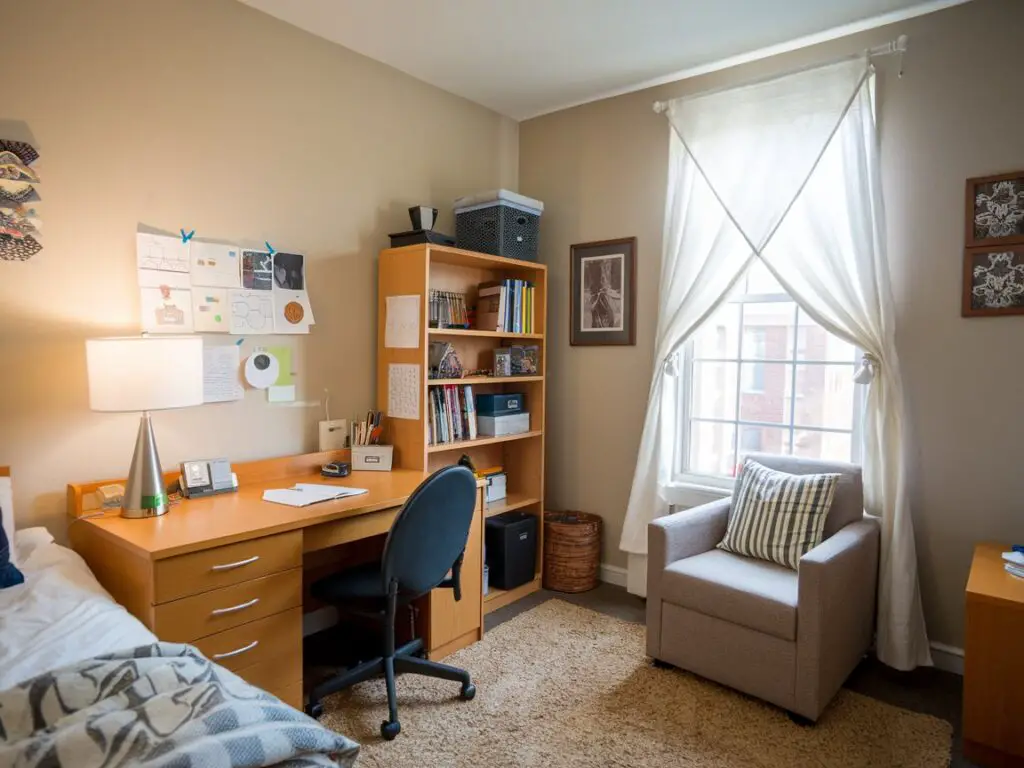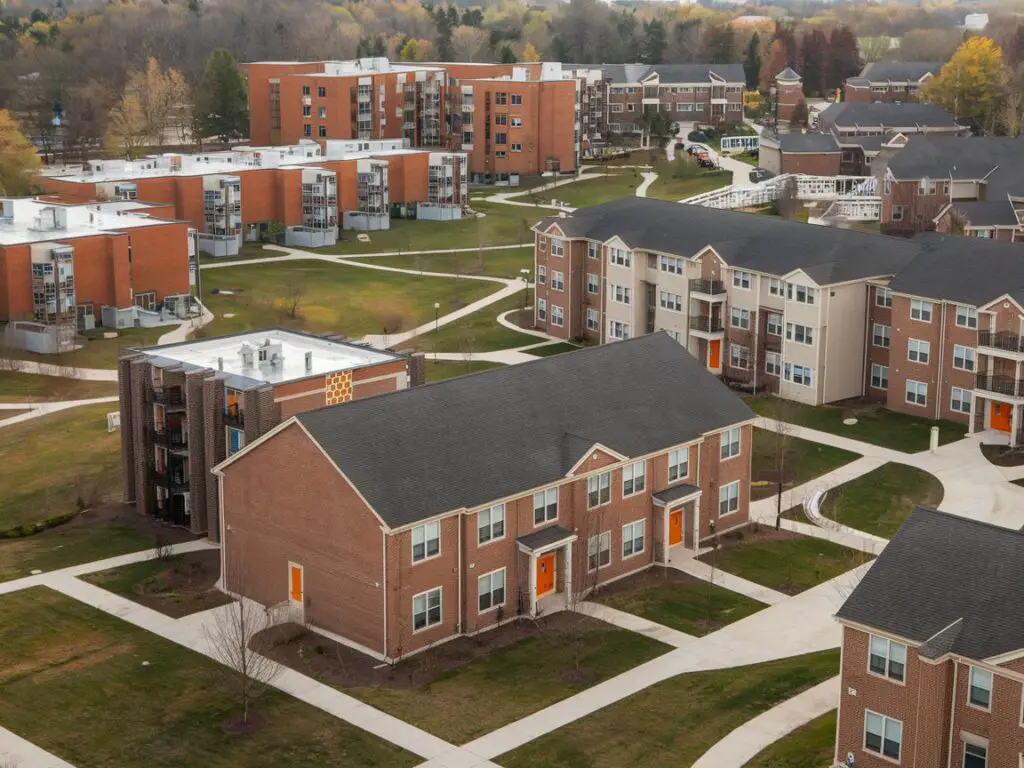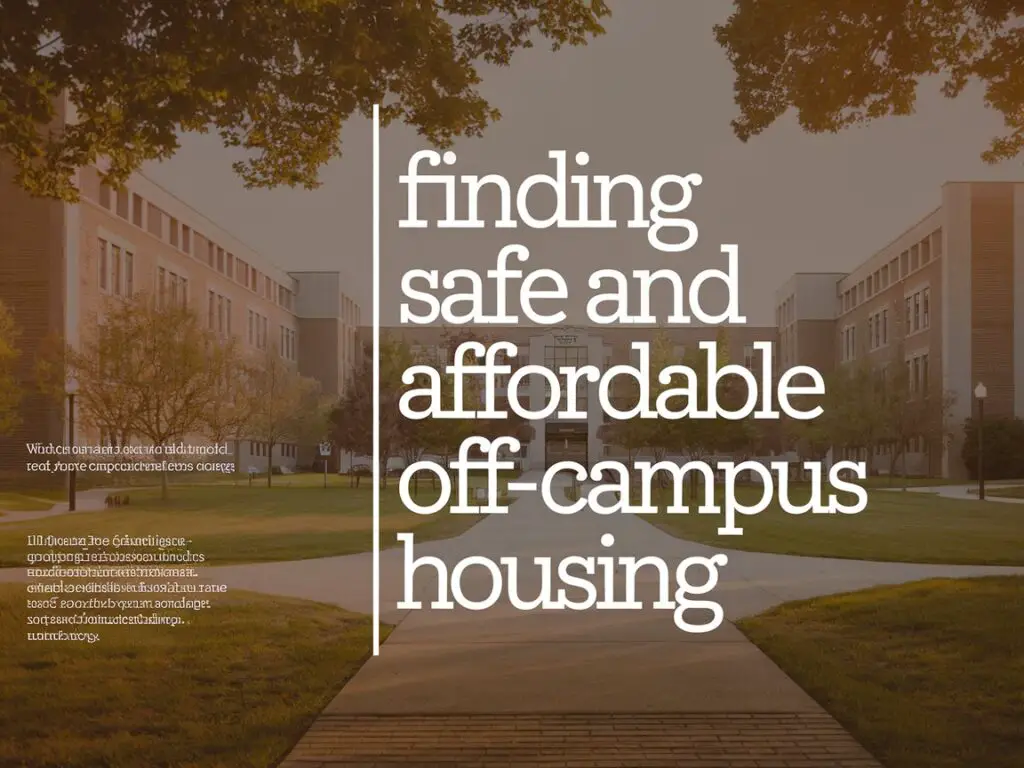Finding affordable housing as a student can be challenging. Rent often takes up a big portion of a student’s budget, leaving little room for other necessities.
Balancing education and living expenses may feel overwhelming, but there are plenty of creative ways to save on rent without sacrificing comfort or safety.
From sharing a space with roommates to exploring unconventional housing options, students have more choices than they think. The key is to be resourceful and willing to think outside the box.
This guide is packed with practical tips and strategies to help you cut costs, make informed decisions, and stretch your budget further while focusing on your studies.
Key Takeaways:
- Lowering rent frees up cash for essentials.
- Affordable housing reduces financial stress.
- Saving now builds strong money habits.
Why Saving on Rent Matters for Students

Saving on rent is more than just cutting costs. It’s about having money for other essentials. College is expensive.
Tuition, books, and meals add up quickly. Rent shouldn’t drain your entire budget.
Many students live paycheck to paycheck. Some rely on part-time jobs or financial aid. High rent makes it harder to focus on studies. Affordable housing means less stress and more freedom to enjoy campus life.
Saving on rent also helps in the long term. You can save for emergencies or invest in your future. Learning these strategies now sets you up for better money habits later.
How to Find Affordable Housing Options

Affordable housing is the first step to saving. Start by researching local neighborhoods. Areas near campus may cost more. Look further away for better deals.
Online tools help you compare rents. Websites like Zillow or Craigslist list student-friendly options. Social media groups are another great resource. Students often share available spaces at low prices.
Visiting during off-peak times can also save money. Many landlords lower rents during summer. Touring several places helps you spot better deals.
Consider student-only housing options. These often include utilities in the price. This can reduce unexpected costs. Make a checklist before viewing properties. Note safety, amenities, and distance to campus.
Tips to Save on Rent for College Students
Saving on rent doesn’t stop with finding a cheap apartment. Here are more ideas:
- Pay rent upfront: Some landlords offer discounts for early payments.
- Sign longer leases: A 12-month lease often costs less than shorter terms.
- Split utilities: Share the bills with roommates to save even more.
- DIY furniture: Skip pricey furniture stores. Thrift or repurpose items instead.
- Negotiate amenities: Ask landlords to include Wi-Fi or parking in the price.
A table can make this clearer:
| Tip | Benefit |
| Pay rent upfront | Potential discounts |
| Sign longer leases | Reduced monthly rates |
| Split utilities | Shared expenses |
| DIY furniture | Lower setup costs |
| Negotiate amenities | Fewer out-of-pocket costs |
Sharing Spaces: The Benefits of Roommates
Roommates can make or break your living experience. The good news is, they often cut rent in half or more. Sharing also means splitting other costs, like utilities and groceries.
Living with others isn’t always easy, but setting rules early helps. Agree on cleaning schedules, noise levels, and shared expenses. This avoids misunderstandings later.
Roommates can also be a source of support. They may help with transportation or provide study companionship. Choose wisely. Trustworthy roommates save money and reduce stress.
By sharing living expenses, students can significantly reduce their financial burden, allowing them to allocate more resources towards their education and personal development. — General housing advice.
Creative Ways to Negotiate Lower Rent

Negotiating rent feels intimidating, but it works. Landlords prefer stable tenants. Use this to your advantage. Highlight your reliability, good credit score, or steady income.
Offer to take care of minor repairs. This adds value for landlords. Suggest paying several months in advance. A secure tenant is worth a small discount.
Timing matters, too. Negotiate during winter when demand drops. Landlords are more flexible during slow rental seasons.
Negotiating rent can lead to significant savings; landlords may be willing to lower prices in exchange for longer lease terms or upfront payments. — General rental negotiation strategies.
Exploring Campus Housing Options

Campus housing offers convenience and cost savings. It’s often closer to classes and includes utilities. This eliminates commuting expenses.
Check if your college provides dorms or apartments. Many have special rates for low-income students. Living on campus also means more social opportunities. You’ll save time and build lasting friendships.
Some schools even offer roommate-matching services. These help you find compatible people to share spaces with.
Always ask about meal plans and included services. Combining rent and food in one payment can simplify budgeting.
Campus housing can often provide a more affordable alternative to off-campus living, especially when considering the additional costs of commuting. — General campus housing insights.
Leveraging Technology to Save Money on Rent
Technology can be a lifesaver when hunting for housing. Apps like Roomster and HotPads make finding roommates easier.
These platforms let you set preferences and match with others quickly.
Use rent calculators to budget better. Apps like Zumper help you spot good deals and track rental trends. These tools save you time and money.
Don’t forget to automate rent payments. Late fees add up fast. Auto-pay features ensure you’re always on time, avoiding unnecessary charges.
Utilizing online platforms and apps can help students find affordable housing options that fit their budget and needs. — General technology advice
10 Smart Ways to Save Money on Rent in 2024
Unconventional Housing Solutions for Students
Thinking outside the box can lead to big savings. Here are some unconventional ideas:
- House-sitting: Live rent-free while taking care of someone’s home.
- Tiny homes: Affordable, eco-friendly, and perfect for students.
- Co-living spaces: Shared housing with like-minded people.
These options aren’t traditional, but they work. House-sitting, for example, often includes free utilities. Co-living spaces sometimes offer community events, which are great for networking.
Saving Money on Utilities and Extra Costs
Lowering utility bills is just as important as saving on rent. Simple habits help:
- Turn off lights when leaving rooms.
- Use energy-efficient bulbs.
- Limit heating and cooling use.
Share internet costs with neighbors if possible. Bundling services like phone and internet reduces monthly bills. Use public resources like libraries to save on Wi-Fi.
Many landlords include utilities in the rent. If not, negotiate for it. Small changes add up over time, leaving you with more to spend on other needs.
Students should consider energy-efficient appliances and shared utilities to further reduce monthly expenses. — General budgeting advice.
Practical Budgeting Tips to Manage Rent Payments
Budgeting keeps your finances under control. Start by tracking your income and expenses. Use a simple spreadsheet or apps like Mint. Knowing where your money goes helps avoid overspending.
Set aside a fixed amount for rent each month. Treat it like a non-negotiable bill. Build an emergency fund for unexpected costs. Life happens, and having extra cash saves stress.
Use this budgeting formula:
| Category | Percentage of Income |
| Rent | 30% |
| Utilities | 10% |
| Groceries | 15% |
| Savings | 20% |
| Other Expenses | 25% |
This structure ensures you cover essentials without going overboard.
Making the Most of Your Living Space
A small space doesn’t mean limited possibilities. Get creative with storage. Use under-bed organizers or stackable boxes to maximize space.
Decorate on a budget. Add personal touches using thrifted or DIY decor. This makes your space cozy without overspending.
Multifunctional furniture is a lifesaver. A bed with drawers or a foldable desk saves room and money. Keep your area tidy. Keeping spaces tidy makes them feel open and inviting.
Maximizing space through effective organization can make even small apartments feel more comfortable and functional. — General interior design tips.
Long-Term Strategies to Save on Rent for Students
Think ahead to save even more. Build relationships with landlords. Being a reliable tenant can lead to lower future rent. Stay in the same place for multiple years if possible. Moving frequently increases costs.
Consider internships or jobs offering housing benefits. Some roles provide free or discounted accommodation. These perks reduce living expenses significantly.
Start saving early for post-college housing. Rent in your student years might be high, but planning ahead sets you up for a smoother transition into independent living.
Investing in relationships with landlords and understanding rental agreements can lead to better terms and lower costs over time. — General rental advice.
How to Split Costs Fairly with Roommates

Living with roommates is a popular choice for students, but sharing costs can get tricky. The key is to set clear rules from the start.
Discuss how to divide rent, utilities, groceries, and shared household items. A fair approach often depends on room sizes or individual financial situations.
Consider using apps like Splitwise to track shared expenses. These tools calculate everyone’s share and prevent misunderstandings. For utilities, ensure bills are equally divided. If one roommate uses more electricity, adjust accordingly.
Establishing a joint fund for shared essentials like cleaning supplies can help. Each roommate contributes a fixed amount monthly, simplifying shared expenses.
Always keep communication open to avoid conflicts. Address any concerns immediately to maintain harmony.
Using Student Discounts to Save Money on Rent

Many students overlook discounts designed just for them. Some landlords or housing providers offer lower rents for students.
Ask your college if they partner with local apartments for reduced rates. These options are often more affordable than private rentals.
Check if utilities like internet or electricity come with student discounts. Providers like Spectrum or AT&T often have special deals. Websites like Unidays and Student Beans can help you find more savings.
If you’re staying on campus, explore bundled packages. Combining rent, food, and utilities under one payment simplifies budgeting. Always keep your student ID handy. It’s your key to unlocking these discounts.
The Pros and Cons of Subletting
Subletting offers flexibility but comes with risks. It’s a good option if you need short-term housing or want to reduce rent costs during breaks.
For instance, subletting your room during summer can save money while you’re away.
However, subletting requires trust. Make sure the subtenant is reliable and follows the lease terms. Always get landlord approval. Unauthorized subletting can lead to fines or eviction.
On the bright side, subletting lets you explore different housing options. On the downside, it may complicate living arrangements. Be prepared for potential damages or disputes. Assess the pros and cons before deciding if subletting works for you.
Finding Safe and Affordable Off-Campus Housing

Living off-campus offers independence but requires research. Start by checking local listings and student groups.
Prioritize safety. Look for areas with low crime rates and easy access to campus.
Visit potential apartments during the day to assess the surroundings. Check locks, lighting, and fire safety measures. Talk to current tenants for honest feedback. Use websites like Apartment Guide or Realtor.com to compare costs and read reviews.
Budget for additional expenses like transportation. An affordable apartment far from campus may cost more in the long run. Balance affordability with convenience and safety to find the best fit.
The Role of Location in Reducing Rent Costs
Location heavily impacts rent prices. Apartments near campus or in trendy areas are often pricier. Look for housing in less popular neighborhoods.
These places are typically more affordable without sacrificing quality.
Consider proximity to public transport. Easy access to buses or trains can eliminate the need for a car, saving money. If possible, find housing close to grocery stores or amenities to cut transportation costs further.
Research rental trends in different areas. Sometimes moving just a few blocks can significantly reduce rent. Balancing location and cost is crucial for maximizing your savings.
The location of a rental property significantly impacts its price; areas further from campus tend to offer lower rents but may increase commuting costs. — General housing market analysis.
Furnishing on a Budget: Save on Housing Expenses
Furnishing your space doesn’t have to be expensive. Start with essentials. A bed, desk, and chair are must-haves.
Look for secondhand options on Facebook Marketplace, Goodwill, or thrift stores. These places often have affordable, quality items.
Consider DIY furniture projects. Wooden pallets can be transformed into bed frames or tables. Reusing old items saves money and adds character.
Don’t forget to ask friends or family. Many people have spare furniture they’re happy to give away.
Renting furniture is another option if you need temporary solutions. Budget-friendly furnishing can make your space comfortable without overspending.
Understanding Rental Contracts to Avoid Hidden Fees
Rental contracts can be confusing, but reading them carefully saves money. Look for clauses about hidden fees.
These may include maintenance charges, parking, or penalties for breaking the lease early.
Ask for a breakdown of all costs before signing. Landlords should clearly outline what’s included in the rent. For instance, some contracts cover utilities or amenities like a gym, while others don’t.
Pay attention to terms about security deposits. Understand the conditions for getting it back. Take pictures of the property when you move in to avoid disputes later. A thorough understanding of your contract prevents unexpected costs.
Short-Term Rentals vs. Long-Term Leases

Choosing between short-term and long-term leases depends on your needs. Short-term rentals offer flexibility, making them ideal if you plan to move soon or study abroad. However, they often have higher monthly rates.
Long-term leases usually cost less per month. Landlords may also waive some fees for longer commitments. The downside is less flexibility. Breaking a lease early can be costly.
Evaluate your situation. If stability is your priority, a long-term lease works better. If you value flexibility, short-term options are worth considering. Weighing these factors ensures you make the right decision.
How to Utilize Student Housing Grants and Aid
Student housing grants and financial aid can significantly lower rent costs. Start by applying through your college’s financial aid office.
Many schools offer grants specifically for housing expenses. Research government programs like the Federal Pell Grant, which often includes housing aid.
Some states have additional programs for low-income students. Combine grants with scholarships for maximum savings. Websites like Fastweb list scholarships that cover housing costs.
Always check eligibility requirements and deadlines. Utilizing these resources reduces the burden of rent, allowing you to focus on your studies.
Many institutions offer grants or assistance programs specifically designed to help students manage housing costs effectively. — General financial aid information.
Building a Strong Landlord-Tenant Relationship
A good relationship with your landlord can lead to savings. Start by being a responsible tenant. Pay rent on time, follow lease terms, and keep the property clean.
Communicate openly with your landlord. If you notice maintenance issues, report them promptly. Being proactive shows you’re reliable. This may encourage landlords to offer discounts or prioritize your requests.
Building trust takes time but pays off. A strong relationship can lead to lease renewals with favorable terms or waived fees. Treat your landlord with respect, and they’re more likely to do the same for you.
Maximizing Space in Small Apartments
Small apartments can feel cramped, but smart organization helps. Install shelves or hanging racks to use vertical space. Multi-functional furniture, like a bed with drawers, saves room.
Declutter regularly. Keep only what you need. Overcrowded spaces feel smaller than they are. Use storage bins under your bed or inside closets to keep items out of sight.
Mirrors can create the illusion of space. They bounce light, making rooms seem larger. Arrange furniture to maximize open areas. A well-organized apartment is more comfortable and inviting.
Rent-Free Options: Living with Family or Friends

Living with family or friends is a great way to save money. Many students choose this option to avoid rent entirely.
While it’s not for everyone, it’s worth considering if you’re close to home or have supportive friends.
This arrangement comes with trade-offs. You may have less independence or need to follow house rules. Open communication is key. Set boundaries to ensure everyone is comfortable.
If living with friends, agree on shared responsibilities like chores or groceries. Rent-free living allows you to focus on studies and save for future housing needs.
FAQs About Save on Rent for Students
How can I find affordable housing near campus?
Use online platforms like Zillow and student groups. Look further from campus for better deals.
What are the best apps for saving on rent?
Apps like Roomster, Zumper, and HotPads are great for finding deals.
How can I negotiate with my landlord?
Highlight your reliability and offer to prepay. Negotiate during off-peak rental seasons.
What’s the best way to save on utilities?
Use energy-efficient habits. Bundle services. Share costs with roommates or neighbors.
Final Thoughts
Renting as a student doesn’t have to break the bank. With smart strategies like splitting costs fairly, leveraging discounts, and understanding contracts, you can make housing more affordable. By exploring creative solutions, you’ll save money and enjoy your college experience stress-free. Every little effort counts, and these steps can make a big difference!



